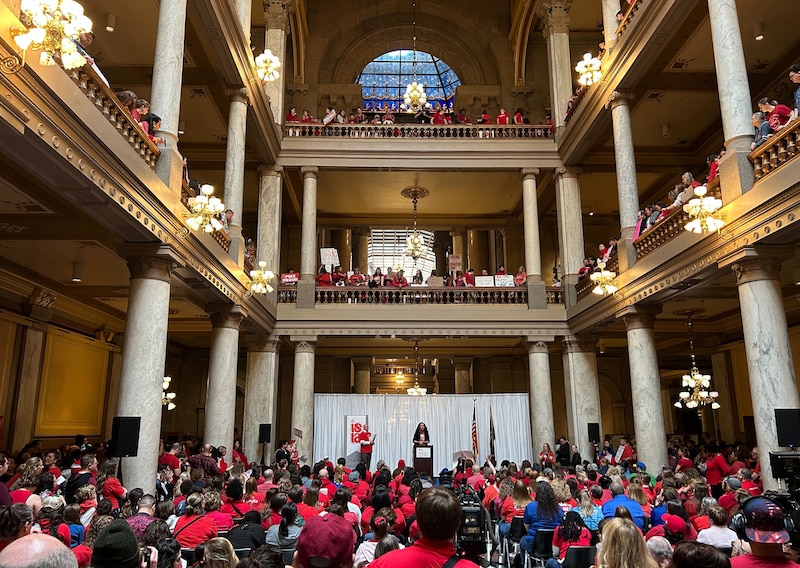Sign up for Chalkbeat Indiana’s free daily newsletter to keep up with Indianapolis Public Schools, Marion County’s township districts, and statewide education news.
An Indianapolis Public Schools board member, elected with the backing of charter-supportive groups, found a sticky note slapped on her windshield that read “F--- you.”
An anonymous text message sent to Indianapolis residents featured one pointed remark: “Did you know that IPS Superintendent Aleesia Johnson makes nearly $300,000 a year?”
And one charter school leader said he was even accused on Facebook of stealing milk from the school’s goat.
The backdrop for these and other attacks in the Indianapolis education community was a legislative session that included a proposal by state lawmakers to dissolve the district completely and replace it with charters. Legislators ultimately rejected that idea, but they did decide to redirect some property tax revenue from IPS to charters and to create an advisory board focused on school resource sharing.
Disagreements between charter supporters and those who favor traditional public schools are far from new. But the session generated perhaps the nastiest atmosphere in the city’s education community since Indiana allowed charters to open nearly 25 years ago.
The bad vibes began before the session even started. Last September, a group launched a website that highlighted the “hypocrisy” of certain traditional public school advocates who sent their children to charters. In March, a person at a school board meeting held up a photo of a prominent charter school supporter — Mind Trust CEO Brandon Brown — and ripped it in two. In April, a school board member was criticized for “liking” a Facebook comment that had a suggestion for external groups forcing changes to IPS: “We should put these people in holes, not roles.”
This political environment often seemed not to be focused on those who’d be most affected: students.
“I feel like the adults aren’t fighting for the kids at this point,” said Dale Edwin Potter, a senior at Shortridge High School. “They’re fighting for themselves.”
All of that adds pressure to the new Indianapolis Local Education Alliance, the members of which were announced on Friday. Their daunting task: to brainstorm a future for Indianapolis education in which IPS will have to share building and transportation resources with charters — a potentially dramatic power shift.
The venomous political climate highlights big questions for the panel that also apply to Indianapolis as a whole: Will the group help officials and community leaders collaborate to find solutions that provide what students need? Or will the panel, which can meet behind closed doors, only exacerbate the split?
Some charter advocates say they are hoping the future brings cooperation.
“I’m always hopeful and willing to extend the olive branch to the other side, to listen to what they want to hear, to listen to their perspective, to respect their position,” said LaToya Tahirou, a parent active in the Stand for Children Indiana organization that has pushed the district to partner with more charters. “I’m not so close-minded that I don’t want to hear anything that they want to say.”
But some IPS supporters see such calls for unity as disingenuous, given the gains charter schools made this session. And they’re also worried about a different issue: a future with increased funding for universal private school vouchers. That shift could create an even fiercer scrum for money and students than the one today.
“Competing for the same limited amount of money is not exactly conducive to building partnership,” IPS school board member Gayle Cosby said.
Legislative session highlights Indianapolis school choice debate
The city’s long and complex relationship with school choice is at the heart of how both sides of the debate will move forward.
The charter sector has grown since the creation of the charter law in 2001, and now includes over 50 schools within Indianapolis borders alone that educate over 22,000 students. IPS, meanwhile, has lost students yearly while undergoing multiple rounds of school closures and currently serves about 21,000 students in its traditional schools.
Charter critics have long argued that the goal of influential pro-charter organizations is to destroy IPS. They also say that these organizations — often grouped together as the Mind Trust, Stand for Children Indiana, and RISE Indy — get major help from wealthy donors, which unfairly tilts the playing field. And they argue that the white male leadership of some of those groups is exploiting students of color as they undermine traditional public schools.
Charter supporters argue that charter schools operate with little to no property tax dollars while showing better academic results — particularly among students of color whom IPS has historically failed to serve. And parents affiliated with Stand for Children say that implications from charter critics that other people tell them what to say is insulting.
The school board, meanwhile, sits in the crosshairs of these and other arguments.
Campaign donations to board members from charter-friendly groups fuel a belief among charter critics that the board is controlled by these groups. But charter groups don’t necessarily act in public like they run the board: Parents affiliated with Stand for Children, for example, have tried to get the board to partner with charters.
During the legislative session, the decisions prominent officials and advocates have made about where to send their own children to school did not escape scrutiny.
One website launched months before the session took aim at charter critics who sent their children to charter schools such as Christina Smith of the Indianapolis Education Justice Coalition and Cosby. The site, which says their choices “reveal that they know charters provide opportunities IPS can’t,” does not publicly say who created or supports it.
Such arguments are similar to claims from supporters of private school vouchers that those who oppose vouchers yet send their own kids to private schools are hypocrites.
Cosby and Smith acknowledged that they have sent their children to charter schools. But they said there is still a need for charter accountability, and that school choice should not come at the expense of traditional district schools. Cosby, who was criticized for “liking” a Facebook comment insinuating violence, later told Chalkbeat she did not read the comment in its entirety and removed her “like.”
Brown, the Mind Trust CEO, said he expects, to some extent, to be the punching bag when working to change system-level policy.
“We also can’t respond to relentless attacks all the time, because it’d literally be all that we do,” Brown said. “And I think that there’s a big difference between advocating forcefully for policy and relentlessly attacking, personally, your opponents.”
RISE Indy, meanwhile, has rejected claims that its intent is to destroy IPS. The nonprofit also has given college scholarships to students in both traditional public and charter schools and has a leadership training program that several IPS board members have completed
Some hope IPS and charter schools can regroup
What’s not in much dispute is that the new laws from this session created winners and losers.

Charter schools will likely receive thousands of dollars more per pupil in new property tax revenues. IPS is projecting the closure of schools and the loss of millions in funding, due to charters’ new share of revenue and other state tax reforms.
Some are hoping that the Indianapolis Local Education Alliance led by Mayor Joe Hogsett will promote collaboration and reduce inefficiencies. Hogsett’s office did not respond to requests for interviews about the organization, but the mayor has said there will be opportunities for community input and for public meetings.
The group includes appointees from the mayor and the superintendent, including one parent from a traditional school and one parent from a charter school.
But others worry about the competition district-run schools and charters may see in coming years from private schools. While a vast majority of Hoosier families could already use vouchers before this year, lawmakers this session changed state law to allow any family, regardless of income, to receive taxpayer money to help cover private school tuition.
As Potter, the 18-year-old Shortridge High student, prepared to graduate this month, he wondered about the uncertainty of his younger brother’s future in IPS.
“I do think both sides need money,” Dale said. “And I still don’t think it was right to just take money from charter schools or take money from public schools.”
At the same time, Joel Gilesealle wants more students like him to be able to participate in the dual-credit classes he’s taken as a student at the Believe Circle City charter high school.
“I see what the school does for me and I see what the teachers do for me and I’m like, imagine what they could do if they had more money,” said Gilesealle, who testified at the statehouse this year to support more funding for charter schools.
But Potter believes the charter sector and IPS can still salvage their relationship.
“I still think there’s hope for IPS,” he said. “And there’s hope for what we can still do and become.”
Amelia Pak-Harvey covers Indianapolis and Lawrence Township schools for Chalkbeat Indiana. Contact Amelia at apak-harvey@chalkbeat.org.

